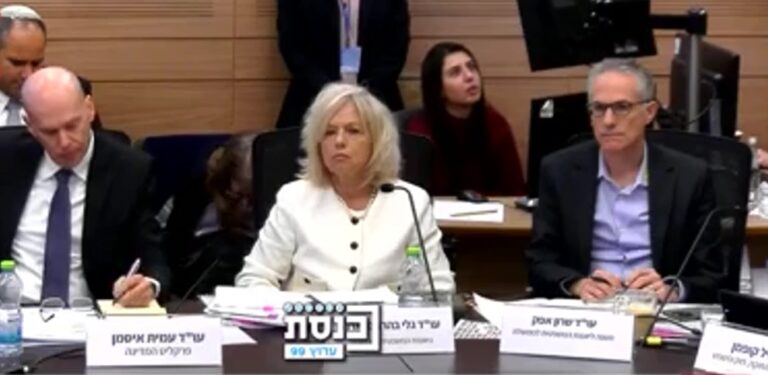 By Rabbi Yair Hoffman for the Five Towns Jewish Times
By Rabbi Yair Hoffman for the Five Towns Jewish Times
THE HEROES
They are the true heroes behind our Yeshivos and Day Schools. They work 50, 60, sometimes 80 hours a week to ensure that the teachers, Rabbis, and staff get paid. They are the Yeshiva administrators, whose job it is to seek philanthropists to pay for student scholarships, to keep down expenditures, and to nudge parents for tuition.
THANKLESS TASK
Their’s is a thankless task. It is hard work, both in terms of the nature of the job and in terms of the impact upon their social lives. At times, they must refuse raise increase requests of employees. At other times, they have to be very tough on parents who have fallen severely behind on tuition.
But may they avail themselves of the ultimate weapon? Can they actually bar entry? Can they say and act upon the headline of this article, “No tuition – no re-admission?”
CASE IN POINT
Two siblings were in two local schools. The father of the older boy told the Yeshiva that he needed a major reduction in tuition or he was pulling the boy out. The Yeshiva told him, “Sorry, we don’t do that.” The boy was yanked out and placed in public school.
That boy’s younger sibling was in another institution. They understood the family’s precarious finances. They were as accommodating as can be.
The final outcome? The older boy married a gentile. The younger sibling studied in Eretz Yisroel and now, after returning to the United States, teaches in a Yeshiva. Hundreds of our local students have been inspired by the latter, and it all could have turned out very differently – just by virtue of the tuition policy of an executive director. This is a true story that has unfolded recently – very recently.
HALACHIC SOURCES
The Gemorah in Sanhedrin (91a) states, “Whomsoever denies halacha from the mouth of a student, it is as if he has robbed him of the inheritance of his fathers, as it states, Morasha kehilas Yaakov – it is an inheritance of the congregation of Jacob. The Gemorah further writes that even the fetuses in the wombs of their mothers curse such a person who denies anyone their Jewish heritage. ”
The Maharal, comparing the Torah to a bride, writes in his Drush Al HaTorah (p.109) that the Torah is engaged not just to select individuals within the nation of Israel – but to all of Israel equally. Thus denying the poor the chance to learn Torah is tantamount to the greatest of sins. Indeed, the Maharal further explains that it belongs more to the poor than to the wealthy, as the Gemorah in Nedarim says (81a), “Take heed of the poor, because through them will come Torah.” His explanation is that the Torah was given in a bare wilderness with no worldly materials – the equivalent of an atmosphere of complete indigence.
Rav Meir Shapira zt”l, the founder of the Daf HaYomi gave a different explanation to the Gemorah in Nedarim of taking heeding of the poor. He explained that it is because the parents, who paid even a minimal tuition, had paid whatever they could pay with dearly earned money. They had given up their hard-earned funds with mesiras nefesh, immense dedication, in order that their children should be able to learn Torah. It is impossible for such Mesiras Nefesh to not yield anything but Torah.
THE RULING IN SHULCHAN ARUCH
The Ramah in Choshain Mishpat (163:3) rules that in a city where there is a Melamed Tinokos – a Rebbe for children, and the father or fathers cannot afford to pay, the obligation rests upon the community to collect funds based upon the wealth of each individual. He rules likewise in regard to the hiring of a Chazan referencing the Shulchan Aruch’s chapter in Orech Chaim (53:23). This ruling of the Ramah is based upon a Rabbeinu Yerucham (Nesiv 29 Vol. III).
Rav Yaakov Kamenetsky zt”l ruled that this Ramah, which formed the basis of the Cheder payment system in Europe for many centuries throughout the European exile, still applies in today’s age with the modern Yeshiva system (See Mechitzas Rabbeinu page 106). If, however, the father is wealthy enough that he can adequately pay, then the Yeshiva may refuse the child entry until the father does so. Otherwise, however, they may not do so.
Rav Yitzchok Zilberstein in Shailos UTeshuvos b’Hilchos Chinuch (responsa #61) rules that it is absolutely forbidden for a Yeshiva to actually refuse admission to a child based upon non-payment. Rav Yaakov Kamenetsky ruled the same way (see footnote 106 in Emes L’Yaakov to YD 245:4).
MAY A YESHIVA THREATEN?
In recent years, a system has evolved to ensure that parents settle previous obligations before they can register their child to classes. This system is called the admission card – without which one cannot receive a schedule, be placed on the attendance sheets, and receive books and materials. It is said from Rav Yaakov Kamenetzky zt”l said that one may threaten not to admit but actually carrying out the threat is not permitted.
What happens if a parent receives such a letter, does not get an admission card, and actually does not register his child as a result? Poskim have ruled that there is an obligation upon the school to follow up with the parent and ensure that things can be worked out. It is forbidden to issue such a threat without ensuring that everyone who received such a letter is contacted.
But what is a school to do when faced with no payments? Most philanthropists are tapped out already on “more exotic Tzedakos” rather than the local Yeshiva. Some communities have worked out a special scholarship fund that each school can go to when the parent has no funds to pay. This is the situation in Chicago, for example. Other communities have not had such innovative developments. As a result, many Jews are lost to their people.
Indeed, in our times, the situation might be significantly worse than the case of the Ramah in Choshain Mishpat. Within the great melting pot that is America, it is highly likely that attending a public school will directly lead to shedding one’s Jewish identity – no matter how strongly affiliated the family is at home. Poskim have ruled that such a move could directly lead to abandonment of Shabbos, Kashrus, Judaism. As in the local case cited above, it can also lead to intermarriage. It is thus, by far, a greater obligation than that which was discussed in the Shulchan Aruch. By virtue of this latter ruling, the halachos of denying a Yeshiva education applies to both boys and girls.
The situation has entered into a crisis mode. These are children in our communities that are now in public schools by reason of financial hardship of the parents. In out-of-town communities too, the crisis is reaching epic proportion.
The Ramah in Choshain Mishpat continues that even those who no longer need the particular need of the community must still be forced to pay. The Ramah further indicates at the end of paragraph three that those who are older and have no need for a wedding hall or Mikvah must still contribute. We need individuals to step forward in the Yeshivos and schools that they are affiliated with, and form just such scholarship fund. We need our own “No child left behind” program.
The author can be reached at [email protected]











12 Responses
There are specific verses in the Torah that require a business to pay its workers on time and to pay its bills. A school that does not do those things is as orthodox as one that serves cheeseburgers for lunch. That is what happens when schools can’t collect tuition.
This issue is the scourge of our (Jewish) time. I cannot express how much blood, sweat, and tears have been shed, how much sholom bayis destroyed as parents try to make ends meet and feed the insatiable beast of tuition. How many parents have decided to limit p’ru u’rvu (halachicly or not) because they know they won’t be able to afford the future expenses? And when its not enough? Further shame and degradation await. I will never forget, nor forgive the principal who pulled me out of class one day, told me its because “your parents didn’t pay” and left me in the yeshiva beis medrash for the rest of the day until dismissal. I will NEVER be mochel for my family’s, and my embarrassment.
This is a tremendous problem when the yeshivah is a public, communal endeavor, its a whole ‘nother ball of evil wax when its a privately owned institution used as vast not-for-profit, unlimited bank account (v’hameyvin yovin). Smart individuals have come up with ways to alleviate the financial burden by having the schools work smarter (ie: Melamed Academy) but this has yet to gain traction.
There r lots of problems in the system. The tuition requested is generally way above what the standard wage earner can afford. Plus there are lot’s of extras mandated by the school on top of the unaffordable tuition. So what is the answer
So the “Real Heroes” are the Administrators who work hard with a nice salary. The Rebbes who work just as hard and just as many hours with a poor salary are the poor shleppers. I think you have said it well.
Where did the minhag of high tuition come from? Several centuries ago we didn’t turn away students. We expected students to be frugal (e.g. the esen tag system — no expensive prepared meals for them) and schools had a minimal administration – but we didn’t turn Torah into a hachma for rich kids only.
Larger class size would help. It might be able to make more use of distance instruction to increase the student-teacher ratio (which lowers costs). Students should be expected to bring their meals to school. Anything not critical for learning should not be required (get rid of field trips, for example).
Let’s not forget the ridiculous dress requirements in my lovely town. Why my 5 year old son can’t have a bit of white on his sneaker (only on the soles) is beyond me! So, what happens is, I had to spend hundreds of dollars in extra costs just to send the kids off to Yeshiva/school. But G-D forbid if I fall behind on my tuition as a result! Don’t get me wrong, I totally understand the need for some dress code but it is WAY WAY out of hand. It is bordering on retarded. I personally believe many of these stupidities, both on parents parts and the schools part develop a certain sense of hypocrisy in the children and as a result, we may have one of the highest rates of children off the derech.
Does anyone know what the average income in America is? Regular Joe out there makes about $50,000 a year. For the entire Jewish community, especially those living in urban areas, numbers like that are laughable, even with combined incomes of both spouses. And the fact is that most middle class Americans barely make ends meet, so imagine the average Jewish family with a handful or two of kids, and higher costs of kashrus and holidays etc. it’s a miracle we can survive at all, let alone with the staggering burden of tuition. While some communities boast large yeshivas with more moderate tuitions ($5-6000) many ask for far far more, some in my community as high as $15,000 or more a child. Then of course they expect you to beg your way to a lower tuition.
Uncle Sam has plenty of money to pay for public school kids,($20,000 a kid in NY last I checked) let’s convince our elected officials to direct more of our hard earned tax money our way.
Well, I guess most people won’t have difficulty figuring out which town I was referring to, even though YWN chose to omit the name.
Charliehall you need to reread the deal. Tuition is not the only way to pay payroll. There are many, many, ways to fund a school.
I think if most people really analyzed how much tzedaka they give to yeshivos and organizations NOT in their town they would be shocked. This is due the flood of parlor meetings and dinner honorees (with no apologies to the people who cannot afford a $360 minimum ad). Of course,it’s often the largest donors who are honored, so it’s everyone else who is put in a bind to feel obigated. Of course, there are many worthy organizations, but the poor of one’s city come first. Only a top-down order from the community vaad can be effective to make sure the local yeshiva students and rebbeim are covered before allowing any outside solicitation to residents.
The problem is that yeshivas today had become a private business very few community owned I stutuons are still around
Between diners tuition and anything else they can. LEED you for. Where’s the money going
Adopt-A-Yeshiva rather than Adopt-a-Kollel, perhaps?
Where I am, we are regularly shamed and cajoled into supporting Adopt-a-Kollel, with the message that it’s the biggest mitzvah we could do with our money.